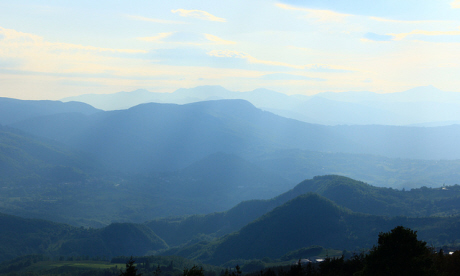
Nadia Attura faces her fears as Italy goes snake crazy
In Cocullo, a small medieval village perched high in the Apennines, the locals are preparing to celebrate Europe’s oldest festival – a bizarre mix of pagan rites, ancient rituals… and snakes.
Every year on the first Thursday in May, Cocullians take to the streets with locally caught snakes. The D’Omazio sisters – owners of the village bakery – catch theirs with their bare hands. “All our spare time is spent looking for snakes,” says Antonietta D’Omazio. “We grew to be serpari (snake charmers); I can’t explain why.”
The Processione dei Separi dates back over 3,000 years to the Marsi tribes who worshipped the goddess Angizia with snakes. They believed she protected them from wolves, bears and malaria. When the ancient Greeks and Romans invaded they adapted the worship to the god Apollo. Finally, the Christians conquered, sanctified the ritual and adopted Saint Domenico.
Giuseppina D’Omazio shows me her scars. “It was about ten years ago,” she explains. “The festival was coming up and I hadn’t caught a snake. I became desperate. While driving home I saw something slide into the bushes, so I jumped out and grabbed its tail; unfortunately, when it swung round, I realised it was a viper. I let go but it sprang back biting me twice.” She spent the next four days in hospital. Still in pain, she discharged herself early, caught another snake and made it back in time to join in with the procession. The D’Omazio family has never missed a festival.
Prizes are awarded to those who bring the rarest, the longest, the largest and the most snakes. Beppe places his 11th snake between his fingers. “A good day’s pay!”
he laughs, adjusting serpent number 12.
I couldn’t agree – his hands were pierced with bites, and two of his snakes were chewing each other.
In Italy it’s illegal to kill or capture wild animals, with fines of up to €1,000, but the law turns a blind eye in Cocullo. Animal-rights organisations have long fought to see an end to its ‘barbaric practices’, but Antonietta strongly disagrees: “Keeping exotic animals locked in houses all their lives is cruel. Snakes have always lived around us. In these mountains, our paths cross. We have learned to accept our environment and, by handling snakes, we have removed fear and made them part of our lives.” Antonietta applys antiseptic to her arms. “Occupational hazard,” she murmurs.
There are five species of local snakes and all are harmless, apart from the viper, which must have its fangs snapped. Police and serpari look out for vipers with fangs and for unscrupulous traders buying snakes. As the wooden statue of Saint Domenico bursts out of the church, the crowd of 10,000 falls silent. This is the most important part of the day: to ensure good fortune, the snakes must remain on the statue; it’s a bad omen if they fall off.
They fell off in 1984 – the year radioactive fog from Chernobyl hit Italy. This year the snakes stay put, the crowd applauds, church bells ring – the festival begins.
The procession hustles through the crowded streets, pushing people against walls. Pilgrims pin money to the statue to ensure their return. “This is the happiest day of my life,” beams Carlo who, having spent 40 years in Canada, has returned for good. He affectionately kisses his latterina snake: “I have come back to my people and my beautiful snakes. Today I feel like a man again.”
The parade winds through the village and finishes back at the church, where most people are now handling snakes. Recent parades have included pythons, boas and cobras,
a fact that angers the mayor Mr Volpe. “Corruption!” he shouts. “This is not a snake parade or an excuse for exotic city pets! Our festival honours our ancestors and our environment – without it we wouldn’t be who we are.”
My fear is gone – never again will so many snakes surround me. That evening I returned to my grandfather’s farm; my family was busy cutting the grass from under the olive trees. Finally at peace with nature, I joined in.